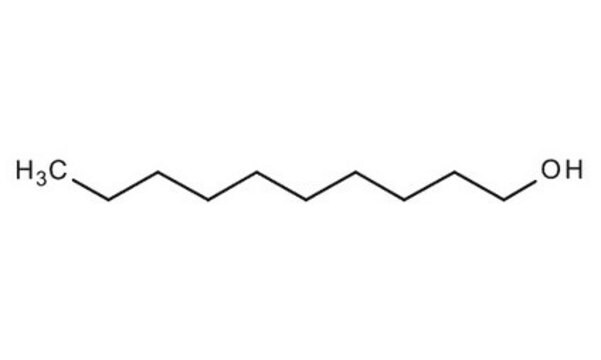126799
1-Dodecanol
reagent grade, 98%
Synonyme(s) :
Alcohol C12, Dodecyl alcohol, Lauryl alcohol
About This Item
Produits recommandés
Qualité
reagent grade
Niveau de qualité
Densité de vapeur
7.4 (vs air)
Pression de vapeur
0.1 mmHg ( 20 °C)
Pureté
98%
Forme
solid or liquid
Température d'inflammation spontanée
500 °F
Limite d'explosivité
4 %
Indice de réfraction
n20/D 1.442 (lit.)
Point d'ébullition
260-262 °C (lit.)
Pf
22-26 °C (lit.)
Solubilité
water: slightly soluble 1 g/L at 23 °C
Densité
0.833 g/mL at 25 °C (lit.)
Chaîne SMILES
CCCCCCCCCCCCO
InChI
1S/C12H26O/c1-2-3-4-5-6-7-8-9-10-11-12-13/h13H,2-12H2,1H3
Clé InChI
LQZZUXJYWNFBMV-UHFFFAOYSA-N
Vous recherchez des produits similaires ? Visite Guide de comparaison des produits
Description générale
Application
Mention d'avertissement
Warning
Mentions de danger
Conseils de prudence
Classification des risques
Aquatic Acute 1 - Aquatic Chronic 1 - Eye Irrit. 2
Code de la classe de stockage
11 - Combustible Solids
Classe de danger pour l'eau (WGK)
WGK 2
Point d'éclair (°F)
249.8 °F - closed cup
Point d'éclair (°C)
121 °C - closed cup
Certificats d'analyse (COA)
Recherchez un Certificats d'analyse (COA) en saisissant le numéro de lot du produit. Les numéros de lot figurent sur l'étiquette du produit après les mots "Lot" ou "Batch".
Déjà en possession de ce produit ?
Retrouvez la documentation relative aux produits que vous avez récemment achetés dans la Bibliothèque de documents.
Les clients ont également consulté
Notre équipe de scientifiques dispose d'une expérience dans tous les secteurs de la recherche, notamment en sciences de la vie, science des matériaux, synthèse chimique, chromatographie, analyse et dans de nombreux autres domaines..
Contacter notre Service technique










